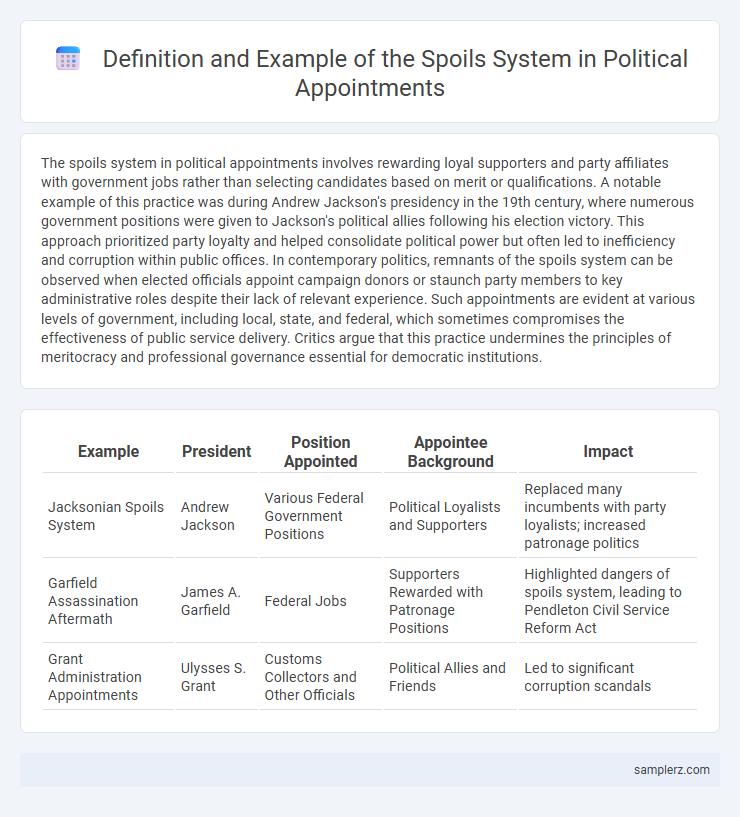The spoils system in political appointments involves rewarding loyal supporters and party affiliates with government jobs rather than selecting candidates based on merit or qualifications. A notable example of this practice was during Andrew Jackson's presidency in the 19th century, where numerous government positions were given to Jackson's political allies following his election victory. This approach prioritized party loyalty and helped consolidate political power but often led to inefficiency and corruption within public offices. In contemporary politics, remnants of the spoils system can be observed when elected officials appoint campaign donors or staunch party members to key administrative roles despite their lack of relevant experience. Such appointments are evident at various levels of government, including local, state, and federal, which sometimes compromises the effectiveness of public service delivery. Critics argue that this practice undermines the principles of meritocracy and professional governance essential for democratic institutions.
Table of Comparison
| Example | President | Position Appointed | Appointee Background | Impact |
|---|---|---|---|---|
| Jacksonian Spoils System | Andrew Jackson | Various Federal Government Positions | Political Loyalists and Supporters | Replaced many incumbents with party loyalists; increased patronage politics |
| Garfield Assassination Aftermath | James A. Garfield | Federal Jobs | Supporters Rewarded with Patronage Positions | Highlighted dangers of spoils system, leading to Pendleton Civil Service Reform Act |
| Grant Administration Appointments | Ulysses S. Grant | Customs Collectors and Other Officials | Political Allies and Friends | Led to significant corruption scandals |
Historical Overview of the Spoils System in Political Appointments
The spoils system, notably exemplified during Andrew Jackson's presidency in the early 19th century, institutionalized the practice of appointing loyal party supporters to government positions as a reward for political support. This approach prioritized partisan allegiance over merit, resulting in widespread patronage and frequent turnover in federal appointments. The Pendleton Civil Service Reform Act of 1883 eventually curtailed the spoils system by introducing competitive exams and merit-based hiring for many government roles.
Notable 19th Century Examples of Patronage
The spoils system prominently influenced 19th-century American politics, exemplified by Andrew Jackson's presidential appointments, which rewarded loyal supporters with government positions. Another notable case is the appointment of Chester A. Arthur as Collector of the Port of New York, a key patronage post that consolidated the Stalwart faction's power within the Republican Party. These examples underscore how political patronage shaped administrative structures and party dynamics during this era.
Spoils System: The Andrew Jackson Administration
The spoils system under Andrew Jackson's administration exemplified political patronage by appointing loyal supporters to key government positions, often disregarding merit or qualifications. Jackson's approach led to widespread replacement of incumbents with Democratic allies, significantly shaping federal bureaucracy during his presidency from 1829 to 1837. This practice reinforced party loyalty but also sparked criticism for fostering corruption and inefficiency.
Case Study: The Pendleton Civil Service Reform Act
The Pendleton Civil Service Reform Act of 1883 marked a pivotal shift from the spoils system by establishing merit-based appointments through competitive examinations. Before the Act, political supporters were routinely rewarded with government positions regardless of qualifications, leading to widespread corruption and inefficiency. This legislation laid the foundation for a professional civil service, reducing patronage and promoting competence in federal employment.
Modern Instances of Political Patronage
Modern instances of the spoils system in political appointments are evident in the frequent use of patronage to fill government positions with loyalists rather than qualified professionals. This practice is particularly visible in local and state governments where elected officials reward campaign supporters with jobs, contracts, or other benefits. Such patronage undermines merit-based hiring, impacting the efficiency and integrity of public administration.
Impacts of the Spoils System on Government Efficiency
The spoils system, exemplified by President Andrew Jackson's widespread appointment of loyal supporters to government positions, severely undermined government efficiency by prioritizing political allegiance over merit. This practice often resulted in unqualified officials managing critical departments, leading to widespread corruption and mismanagement. Consequently, essential services slowed, and public trust in government institutions deteriorated significantly.
Spoils System in Local Government Appointments
The spoils system in local government appointments often involves awarding key positions to political supporters and campaign donors, rather than to the most qualified candidates. This practice undermines meritocracy and can lead to inefficiency and corruption within municipal administrations. Historical examples include post-Civil War American cities where mayors distributed government jobs as political rewards to secure loyalty and control.
International Comparisons: Patronage Practices Worldwide
Political patronage systems vary globally, with the spoils system prominent in countries like the United States during the 19th century, where government jobs were allocated to loyal party supporters. In contrast, the United Kingdom adopts a more meritocratic approach through the Civil Service Commission, while countries like India balance political appointments with bureaucratic professionalism to manage diverse and large administrations. Comparative studies reveal that patronage practices often reflect historical, cultural, and institutional contexts, influencing governance and public trust in varying degrees worldwide.
Reforms and Anti-Spoils System Movements
The Pendleton Civil Service Reform Act of 1883 marked a pivotal shift away from the spoils system by instituting merit-based appointments through competitive exams. Reformers like President Chester A. Arthur championed this legislation to curb corruption and promote efficiency in federal employment. Anti-spoils movements emphasized transparency and accountability, laying the foundation for modern civil service practices.
The Continuing Legacy of the Spoils System in Politics
The spoils system persists in modern politics through appointments where loyalty often outweighs merit, exemplified by numerous presidents filling key positions with campaign supporters rather than qualified experts. This practice undermines institutional efficiency and fosters patronage networks, as seen in the federal agency appointments during the Trump administration. Such legacy challenges democratic governance by prioritizing political allegiance over competence in public service roles.

example of spoilsystem in appointment Infographic
 samplerz.com
samplerz.com